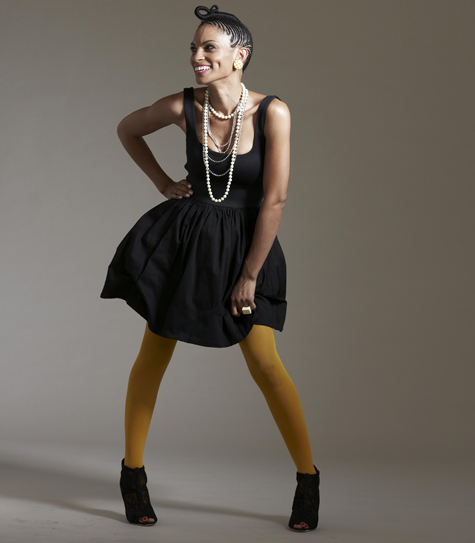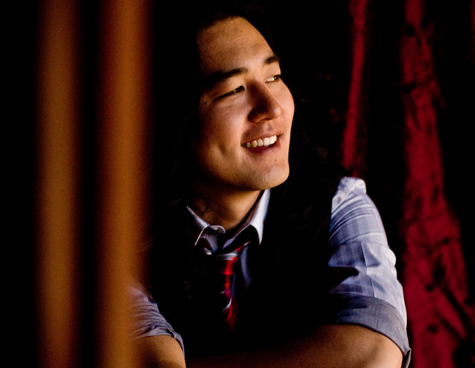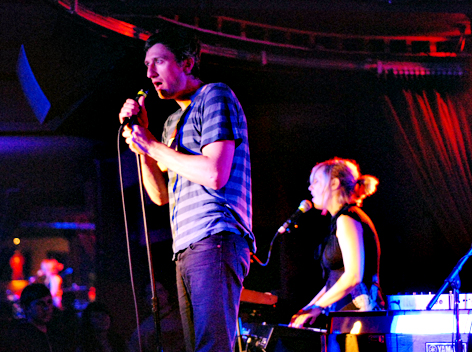Goapele Has the Voice of an Angel, the Spirit of Oakland
Much like her music, Goapele is not a one-dimensional individual. Born in Oakland to a South African father and Jewish American mother, her lineage and upbringing provided a fountain of culture for her to draw upon. From activism to the arts, she absorbed it all and channeled her experiences through music. With an angelic voice and adventurous ear, Goapele defies genres and has continued to evolve over the past decade.
Since her debut in 2001 the sultry vocalist has gone on to release three albums. After a five-year hiatus brought on by the birth of her first daughter, Goapele is putting the finishing touches on her fourth, titled Milk and Honey. With big name producers from across the country, the album is a melting pot of sounds, from synth-driven and heavy drums to sweet melodies. Goapele says that becoming a mother played a big part in expanding her world and making her “more open in general.”
“I think it was more so how much bolder and empowered, and also how vulnerable I felt after the whole experience,” she says. “It has expanded my sense of love. Also, it really pushed me through the writing and recording process. I don’t feel like lyrically I’ve changed very much, except that I’m putting myself out there a little bit more on this album instead of holding my cards close.”
A soft-spoken, strong soul blessed with boundless talent, Goapele has all the tools. It’s her world, and she is the architect. In advance of her Aug. 13, 2010 performance at Harlow’s, Submerge linked up to talk about Milk and Honey and some of the misconceptions that follow her.
I heard you say in an interview how people thought you would come back and write lullabies, but how that’s not the case.
Yeah, yeah [laughs]. It’s kind of interesting in that way because it didn’t make my music softer or my lyrics more edited, it made me more open and bold.
Â
With your time off did you find you came back with a renewed energy or creative pulse?
I took my time recording this album, and I feel ready right now. After I had my daughter I took time to be home with her and take advantage of that experience, but I have really dedicated the past couple of years to craft this album the best way I can. What it is was that I was able to take more time than I ever had before because it was on my terms and pace.
Â
I feel it’s been public for a long time that Milk and Honey was your next album title. I’m always interested when a title holds for so long. Did you build down from a certain concept and sort of mold the album off of that?
Well, it was one of the first songs I recorded. It was a very sensual song, and I felt like that would be the overall tone throughout this album. There were songs I was writing at the time that had a different vibe, but I really liked the “Milk and Honey” idea. I like that it was something nourishing and sensual… I need to find more words to explain it [laughs].
Â
Did that song steer you in a certain direction?
Not really, I just kept recording. In the creative process I just like to get everything out there. I hooked up with so many producers and musicians along the way things were always changing. I would feel like, OK, I’m done, but then another opportunity would open up so I just kept going. At the end I think it will all make sense, and it will all tie together. When I first started recording, it started with my in-house producers like Bedrock, Mike Tiger, Dan Electric, and throughout the process I got to work with different people I had met throughout the years like Kanye West; Khao, who is out of Atlanta; Raphael Saadiq and others. More recently I worked with Drumma Boy who produced the next single, “Right Here.”
Â
Again, I read a quote I really liked where Drumma Boy talked about playing you his R&B stuff but you identified with the harder, crunk stuff.
Yeah [laughs]. I feel like as producers and musicians, we have to give our truest selves. That’s what I know him for, so that’s what I want from him. I can come off super laid-back and positive, and I do want my music to have a positive impact, but I’m not strictly a calm, soft and gentle person. I really like hard-hitting drums and bass lines. And then my natural way of singing is kind of laid-back, so I like how those two things fit together.
Â
You have a universal sound, but do you feel there is an element that is a direct reflection of your Oakland/Bay Area roots?
Probably the combination in my sound–that it’s raw but still beautiful. I feel like that is Oakland. It has a rough vibe but it’s gorgeous at the same time. It has the water right there, so much green, but there are other elements that can be rough around the edges. I would be happy if the violence went down, but I do like that people can be individuals and not worry about fitting in a box.
Â
Yeah, I feel like that is really personified in the “Milk and Honey” video. It’s a very elegant video, but you got the two slugs in the bottom row of the teeth.
[Laughs] Yeah, exactly. It’s not typical. We all have so many different aspects of ourselves, and in entertainment it’s like people want us to be one certain way but that’s not how most of us are as men and women.
Â
You may have just answered this, but what do you think is the biggest misconception of you?
Yeah, kind of what we were just talking about and people just wanting to keep me in the neo-soul category. Yes, I have been strongly influenced by soul music and I always want what I do to be soulful, but it does bleed out of that category.
Â
Is that a term you have come to disgust, or are you just kind of eh with it?
It turns me off, but I understand it. When you’re doing something that doesn’t quite fit the titles that are already out there then it’s easy to just make a new title, but it’s the best when you don’t have to have any title at all. Just your name. That’s what I’m working for.
Â
Ex-Cuesta Drive’s Dane Drewis Takes His Music Solo”¦
Well, Sort of”¦
With the disbanding of Cuesta Drive last year, lead guitarist and vocalist Dane Drewis refused to go quietly into obscurity. Drewis’ work ethic speaks for itself as he’s already completed his solo record, Rock & Soul, and scheduled a release party April 30, 2010 at Harlow’s. The album may bear his name, but it’s largely a product of a strong family bond woven by generations of musicians.
Drewis’ familial and discovered influences seep into his style on Rock & Soul, be it a nod to jazz-rock or the heavy riffs of Led Zeppelin. His path to a solo career is not as inevitable as one might assume, but then again some people are fated to rock by stronger forces than blood relation. Although a fondness for DMX might not be apparent in Drewis’ sound, take a few minutes to ask him, and he’ll probably find the connection.
Honestly, the connection is there. While discussing the minor details of composing the drums on the record, Drewis said he listened to a lot of modern music, including sampling drum sounds from N.E.R.D. and The Neptunes. “We definitely studied modern production, even if they were not our style, to listen to the tones they were getting on guitars and drums,” he said. “The music itself still has the classic rock, bluesy, funk and soul edge to it.” He even listened to Lenny Kravitz, admitting he was not a fan of the musician, but an admirer of his production value. “We listened just to understand that if we could put my playing with that tone it would be awesome,” he said. “No one will ever know. It still sounds like our jazzy jam band sound.”
Let’s talk about your family’s involvement in the production of the album.
I guess I’ll start from the beginning. My parents were jazz musicians. They played in cover bands throughout ’70s and ’80s. That’s what they did full time, until they had their second kid, my sister Deena, then they had to get real jobs.
Both my sisters are very musically inclined. I tapped them on the shoulder for the album to come out and sing. Actually, my whole family came out to sing in the studio for the song “Friday Night,” which is the single we’re pushing. We did group vocals and individual vocals. My little sister Janel and I have written a couple songs and Deena is a really good writer. She works for a publishing company called Flatmancrooked. So she’ll shoot me lyrics all the time. We’ve done a couple gigs together, just fooling around. We definitely rehearse at home, but we’ve never got a full, official band going. But, it’s always been a possibility in the back of my mind.
ÂÂ
Since you’ve got your family involved in the recording, do you think you’ll invite them on stage to sing with you at your release show or one of your local gigs?
Well, my little sister is opening for me at Harlow’s for my record release party. She’s 18 and she has no idea how good she is. I always joke that someday I’ll be opening for her. My dad plays bass for me now. But, we’ve talked about doing a couple songs together live. At the Cuesta Drive CD release show two years ago I had both my sisters and my mom come sing backup on a couple songs, but it was so loud. They’re not used to loud rock stuff. They had a hard time hearing themselves through the monitors.
Definitely a possibility. It would be really great to capture on video since we’re filming the whole show. I’ll leave it undecided to surprise people if we do it.
ÂÂ
How has music being the family business strengthened the bond between your parents and your siblings?
It’s come to fruition more so lately than it has in the past. All through high school I was anti-jazz and rock ‘n’ roll. I was into hip-hop. My parents couldn’t stand it. I didn’t touch a guitar until I was 19. I got one in college.
My parents own a restaurant, Strings Pizzeria on Bradshaw, so we’re all working there, but music is our outlet. It’s a way to relax, let loose and de-stress. It’s the number one activity we all participate in, besides working at the restaurant. We do an open mic [at Strings] every Tuesday. When Janel is home, she comes and sings. My dad and I are always there, so it’s our new thing we do.
ÂÂ
So it was never a family tradition to sit and have a drum circle after dinner?
No. When I moved home from college about four years ago, it changed. We’d be sitting around and after a couple glasses of wine that’s when it would start happening. My parents’ friends would make us play or something.
ÂÂ
One of the write-ups on you said that because you were raised in a musical family it was inevitable that you’d be a musician. That notion struck me as strange, and I wanted to know if it felt that way.
It is kind of strange. It was a huge compliment, but so much of it is behind the scenes grinding and self-promotion that takes a strong personal drive. A lot of my friends are incredible musicians and I look up to them, but they don’t have the motivation beyond singing a couple songs around a campfire.
ÂÂ
With the idea of inevitability toward music in mind, did you have a rebellious stretch where you didn’t want to go into the family business? Maybe during your hip-hop days?
I did. My parents joke that all Asian kids play piano, and my parents made me play when I was a kid. I played for two years, and I was pretty good. The day they said I didn’t have to take lessons anymore, I was 14 and I stopped that day.
I couldn’t stand all the stuff they listened to when I was growing up; all the Motown, lots of bossa nova and Latin jazz. I heard it millions of times, but went out of my way to block it out of my mind. Now that I’m older it’s coming back in waves I would never have imagined. They never really pushed it on me. When I asked for a guitar for Christmas, while I was in college, it took them both by surprise.
I heard Led Zeppelin for the first time when I was a senior in high school. That’s how into hip-hop I was. I used to be able to go through whole DMX and Tupac albums word for word. In hindsight, I listen to those records now and there’s a lot of musical stuff going on there. It was my way of rebelling, but it led me here. Couldn’t have been that bad.
ÂÂ
Since your dad is a seasoned musician, has he given you any tips for the road of touring?
He tricked out my van, gave me his amps and some of his guitars. My mom is worried because he’s going out on the road with me.
ÂÂ
She knows what the road is like, too.
She’s having a heart attack. She knows how much we drink and smoke. She’s like, “Keep an eye on your dad.” But, I’m thinking, “Keep an eye on my dad? He’s supposed to keep an eye on me.”
ÂÂ
What’s the status of Cuesta Drive?
I think we’ll do a couple of reunion shows here and there. Thank God we’re still on great terms. It got to a state of the union last year about this time. We sat down in the back of Sweetwater and had a huge talk. We’d just finished that music video for “Rollin’.” We’d been a band for five or six years and we discussed what it exactly it was we were doing. I was pushing for buying a van, getting on the road, quitting your day jobs, be prepared. Originally that was the plan, but you know how guys are, they don’t talk about their feelings and shit.
We’re all gung ho as far as playing music, but our bass player Timmy got into grad school in Idaho on a long shot. We just kind of went our separate ways. I can always see us getting back together to play and jam, but right now I’m trying to make this my career. I have the drummer from Cuesta Drive still; he plays with me live. Timmy is coming home in May and is already talking about doing a couple shows. Why wouldn’t we? I’m sure we’ll always do a couple reunion shows—kind of like The Police [laughs], but on a small scale.
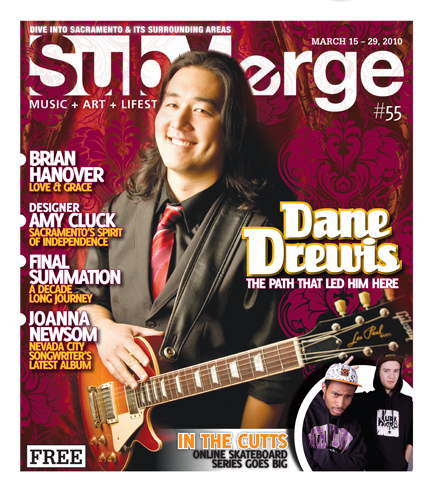
Dane Drewis will celebrate the release of Rock & Soul at Harlow’s April 30, 2010.
A look at the Sacramento scene shake-up in 2009
It was a difficult year for the local musician as at least eight bands met their demise. Swansong shows were played, vans were crashed and relationships collapsed in bittersweet endings. The silver lining in the shambles of bands lost? As we transition into a new decade, we’ll be greeted by fresh and lovely new bands.
That’s how this thing works. Take last year’s demise of The Evening Episode. Had they not called it quits, Terra Lopez would not have gone on to create our beloved Sister Crayon and fill that indie-pop gap in our lives. For now, it’s the breakup that is fresh for these fallen bands. Only last month, Buildings Breeding unplugged from the scene, citing a lapse in dedication as its reason for departure. Vocalist and guitarist Chris Larsen said Buildings Breeding hit a rut after founding guitarist Evan Hart moved to Oakland.
“I can’t really pinpoint what it was that made the decision,” he said. “It seemed the better we’d get, the less people would care.”
Fresh off a May tour, the band experienced a transformation from its lo-fi roots into a polished songwriting style that would become its Kite Fire EP. A man down, the group brought in Kevin Dockter on guitar and Justin Titsworth on drums. “It made the band feel brand new; finally it felt like we had something,” he said. “Even our oldest songs were fresh again. It definitely gave us a second wind.”
Buildings Breeding booked an extensive tour for November to promote the EP, only to learn that three of its six members weren’t available to travel. The band attempted to have friends fill in as best it could, but Larsen said it was apparent from those reluctant moments the band was kaput. “Chris [Vogel] and I would speak every night,” Larsen said. “When we kept coming to the same decision, we knew we had to end it. We decided to honor what local shows we had and add two farewell shows.”
The farewell show happened so frequently this year it could have been considered a fad. Bright Light Fever played its final show at Harlow’s on Sept. 10. The group had a six-year run eulogized by a can of soda.
“We bought a six pack of Sunkist orange soda before we started pre-production on our first record,” Matt Ferro, Bright Light Fever’s guitarist, said. “We drank them all but one can and kept that can in our practice room as sort of a good luck charm for the whole time we were together. When we were loading up for our last show, we looked at it and—no joke—the expiration date was Sept. 10, 2009. Same day as our last show. Poured it out in the back parking lot of Harlow’s.”
It was to Bright Light Fever’s benefit they did not share the newly expired soda. The band’s lifespan was marred by unfortunate events the members wore like an honor badge sash. Within a month of its debut’s release in Oct. 2006 on Stolen Transmission (an offspring label of Island/Def Jam), Bright Light Fever lost its distribution. By July 2007, Bright Light Fever was dropped from Stolen Transmission. The group wrecked two vans in Wyoming on two separate tours. BLF self-recorded and self-released its second record, eventually putting it on the Internet for free download due to “months wasted on empty promises and overall snakery by outside parties.”
The band finally toured without losing money last November. Alas, its follow-up summer tour led to law enforcement issues in Arizona, hitting a deer in Omaha, eight of 12 shows paying nothing and its newest member quitting. “We all genuinely loved the band, so we did it for as long as we could keep our sanity,” Ferro said. “Honestly, all the bad luck inspired us to work harder at what we were doing.”
Punk band Blame Betty attempted to bear the brunt for four years. Lead singer Brooke Sobol said being in a band exposed her to a potential she never understood, but when your band is in a constant shuffle of members, the lack of dedication wanes the drive. The band burned through four drummers, four bassists and two lead guitarists. “The more we accomplished, the more I wanted to accomplish,” she said. “When the dust settled, we had a good, solid group for a long time.”
Blame Betty broke up in September. Sobol said she was exploring a business opportunity that monopolized her time. The stability of Blame Betty suffered. “I just couldn’t do both,” she said. “The pressure of being the front person got to be more than I wanted. I actually have stage fright. There’s a lot of pressure on the front person.” Sobol said she wants to be the girl standing next to the lead now—drinking a beer and playing her guitar like a crazy woman.
Buildings Breeding split without its inner-band relationship suffering. Larsen and drummer Melanie Glover are still together. “Being able to share music with my true love Melanie, it was at times difficult, but so incredible to see her grow as a musician,” Larsen said. This is the exception.
David Mohr found out the hard way when he split with Meg Larkin just before the summer, leaving Sacramento without its premiere dance duo, 20,000. “I tell people now not to be in a band with your significant other,” Mohr said. “People warned me. I should have taken their advice.”
When Mohr ended his six-year run with previous band Didley Squat, he said it felt like an actual breakup, the intimate kind; but losing his band and girlfriend in a breakup was a crushing blow to his psyche. To make matters worse, the laptop they used to make their music was Meg’s computer. Mohr tried to record on his old four-track, but found the process frustrating.
20,000 never had an official last show. The breakup happened amidst scheduled dates around Midtown, each of which drove the nail deeper into the coffin. Mohr remembers one show in particular at Luigi’s Fungarden. “I was dreading that show,” he said. “It was right after we broke up and the plan was to keep the band going. It was just too weird to get on stage with your ex-girlfriend and pretend to have a good time, pretend to be into the songs when really you’re done with it.”
So why is this happening? Mohr said he is concerned by an influx of negative energy. In Bright Light Fever’s bassist Don Suave, he astutely wrote in the band’s obituary, “it has been frustrating to see our fan base consistently waning while, from my point of view, the quality of our work has been consistently waxing. What I’m saying is, ‘It’s all your fault.'” Similarly, Larsen expressed a frustration with the abandonment that came with his band exploring hi-fi aesthetics.
“I think [the band] was let down by that fact because we were all extremely proud of the stuff we were creating together. Add the hopes of being signed to a new label and having them leaving you dead in the dirt, that is sure to shake any band up.”
Blame Betty spent two years convincing a club to let them play and brought 75 paying attendees out on a Thursday night, only to have the rest of the bill spot four people and split the door money. “[The club] didn’t return any of my calls to get another show booked there,” Sobol said. “But, the other band still does shows there.”
Let’s not forget the silver lining. With the dissolution of such great bands, an absence is left within the artist. As Ferro put it, “playing in a rock ‘n’ roll band makes you cool. Like smoking cigarettes. So right now, I’m lacking cool.”
He and his brother Evan immediately continued writing music under the moniker Roman Funeral. The duo hopes to record an album by the spring and tour in 2010. Larsen is doing a “solo-y thing,” while his ex- bandmates have taken to other local acts like bands with ex-The Matches members and playing with Chelsea Wolfe.
Mohr obtained a laptop and has released two free digital records as Favors. His new venture retains the 20,000 sound, but with a lot more heartbreak. He is currently practicing with Ben and Chris of Impotent Ninja, as well as Chris’s girlfriend, which made Mohr wary at first. “I definitely spoke to Chris about it, but I think they might be stronger than Meg and I,” he said. He hopes to do Favors shows by the summer.
Through all the bullshit, each band had no problem expressing its gratitude for the little moments shared among bandmates and fans. For Ferro of Bright Light Fever, it was traveling in a van across the country with brothers and close friends and taking a piss while your bandmates all meet Iggy Pop on a street in Texas. Larsen recalls the feeling after Buildings Breeding’s last show as he thought, “If this many people came to our shows all the time, I would never quit. I could just play Sacramento and Davis the rest of my life.” Sobol recently caught a show with her bandmates. They still flirt with the idea of reforming again, pending a lead singer shows up. Mohr is doing his best to remain friends with Larkin. As of this week, he hopes he can give his friends one last 20,000 record. The two finished, but never released, an album before the breakup. “Up until about a week ago, I didn’t want to get it out,” he said.
Harlow’s Sacramento
Monday, Oct. 6, 2008
Upon entering the dimly lit Harlow’s Restaurant and Night Club last Monday, I was delighted to see that Two Sheds had been booked as the last minute opener for Mates of State. I immediately noticed that it was not only Caitlin and Johnny Gutenberger (who make up Two Sheds) occupying the stage; there was another women sitting in-between the two assisting with vocal harmonies and light percussions, including the tambourine. I later came to find out that it was none other than Amber Padgett of the local duo Spider Silk Dress. Her addition was a great one and Two Sheds entire set was fantastic, but it seemed like the majority of the crowd didn’t care because almost everyone was talking—so loud in fact that it was nearly impossible for me to really focus on the music. Maybe I chose a bad spot to stand (I do that sometimes), maybe they weren’t there for the opening band, but come on people, show the band some respect and shut the fuck up for a few minutes. My guess is that the lack of bass and drums during Two Shed’s set made it easy for the audience’s short attention spans to become even shorter. What a shame.
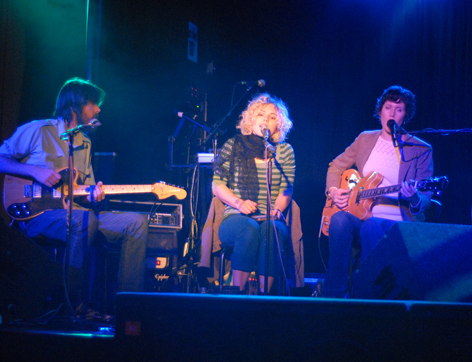
As soon as Mates of State took the stage my theory was proven correct: all it takes is loud drums to get people to shut their yappers (probably because they can’t hear each other talking) and actually focus on the music. As if they were trained to do so, the entire crowd stood up and rushed toward the stage to get a closer look at Kori Gardner (keyboard/vocals) and Jason Hammel (drums/vocals). The two are married and have been making records and touring together since 1997, so they are solid as can be. The chemistry between the two on stage was something I have never before witnessed; you could sense them communicating while playing. They would cue each other with tiny glances or facial expressions to change parts or bring a song to an end.

Their timing and harmonies were flawless, further proving another theory of mine that every married couple should just make music together instead of making babies. When the two would simultaneously sing complementary vocal melodies it was so layered and sounded so huge that it was hard to believe only two people were on stage. At a couple different points during their set, two other musicians joined them: one played cello, adding a very symphonic, cinematic feel and the other played electric guitar (which wasn’t even really noticeable in the mix) and messed around on a laptop playing loops and samples here and there.
Crowd favorites of the night seemed to me to be “Fraud in the ’80s,” and “Like U Crazy,” both off their ’06 release Bring It Back, and “The Re-Arranger” which is on their newest album Re-Arrange Us and on this particular night brought their set to an end (before the obligatory encore of course).
As the show came to an end we quickly guzzled what remained of our beers and stumbled out the door, satisfied with the performances of both artists.

